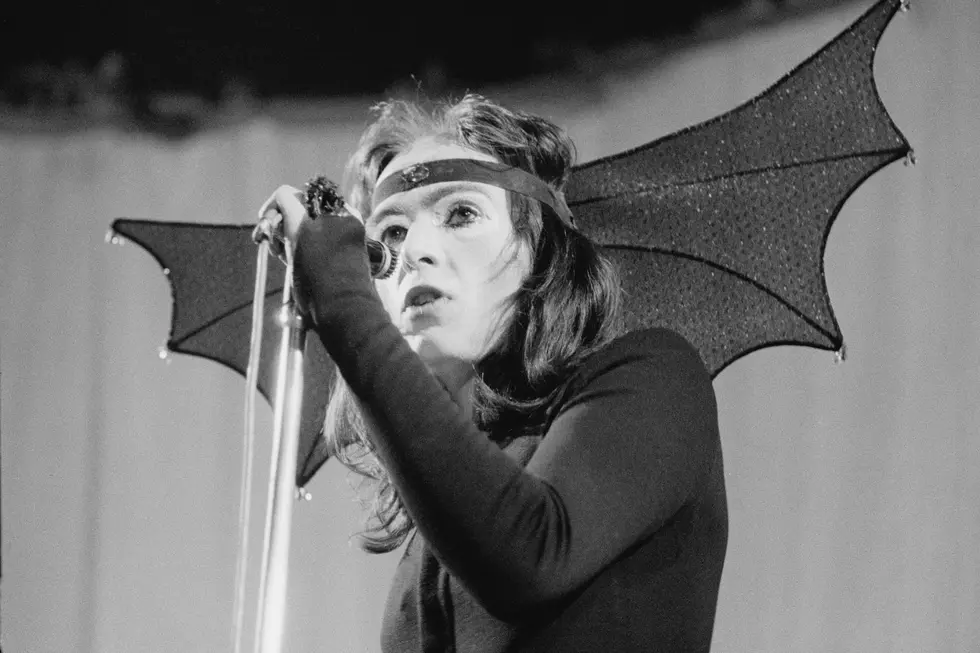
The 10 Weirdest Genesis Songs
Most people, even Genesis fans, would probably describe the band as "weird." Just from a cursory Google Image search, you'll see photos of Peter Gabriel dressed up like foxes and STDs — that's plenty of ammo to fuel the argument without ever hearing a note.
But even within prog, with its odd time signatures and unconventional song structures, Genesis has always been notably quirky. In the early days, Gabriel utilized macabre humor and dense wordplay (see: "The Battle of Epping Forest") — rare qualities in a genre rarely known for playfulness.
And even as the band evolved into tighter, more radio-friendly songs, they frequently made moves no one would expect. Look to "Who Dunnit?": It's a spiky little new wave pop song, built on a hilarious but grating Phil Collins hook — but taken in context, after so many years of epics and ornate arrangements, it's probably the weirdest song they could have recorded. The below list, much like "Supper's Ready," sprawls in many directions. Some of these tracks are strange on a lyrical level; some on an objective musical level; some because, well, Genesis never tried anything else in that vein.
10. "Pigeons" (from 1977's Spot the Pigeon)
Genesis dabbled in classical, hard rock, synth-pop, jazz fusion — all successfully. But music hall? Inspired by the lighthearted style of British performer George Formby, the band took a bold swing with this divisive Spot the Pigeon track, letting Tony Banks' keyboards bounce around Steve Hackett's static, banjo-like twang. "The thing about 'Pigeons' was that it was possible for the band to play a whole note for a whole thing: ding-ding-ding-ding," Hackett noted in 2009. Not exactly hit material!
9. "Harold the Barrel" (from 1971's Nursery Cryme)
It's bright but bleak, hyperactive and horrifying, grim with a grin — there's only one "Harold the Barrel." If you strip away the vocals, it sounds like some kind of mutant pop song, Banks' piano thrashing and Mike Rutherford's slippery bass favoring the upper octaves. But the singing changes everything. In a cartoonish unison delivery, Gabriel and Collins detail the titular Harold's tragic tale: He disappears, ascends to a high window ledge and takes a "running jump," ultimately ignoring the pleas of his gathered family.
8. "Down and Out" (from 1978's ... And Then There Were Three ... )
The rhythm is bonkers, and Collins attacks his drum set with a rare ferocity — before your ears have adjusted, you might mistake those quick snare rolls for record skips. "Down and Out" is an outlier on Genesis' ninth LP, the most unabashed old-school prog moment from their entire trio era. And they famously struggled to recreate that intricacy onstage, playing the song only 38 times.
7. "The Musical Box" (from 1971's Nursery Cryme)
"Having done 'Stagnation' [from 1970's Trespass], which had gone through various different moods, we wanted to do something along those lines but perhaps with a bit more meat to it," Banks told filmmaker Joel Edginton in 2014. The result of that ambition was "The Musical Box," the band's first full-fledged prog epic — and first tangible step into weirdness. The music builds from childlike 12-string chimes to pseudo-classical thunder, a quiet-loud dynamic they'd more brazenly explore down the line. But Gabriel's words put this in the oddball category, presenting a warped Victorian fairy tale filled with rapid aging, croquet violence and creepy sexual advances.
6. "Watcher of the Skies" (from 1972's Foxtrot)
It takes a lot of weirdness to raise the eyebrow of Geddy Lee, but this mellotron-motored epic did the trick. "The music wasn’t about people stepping out and doing bluesy solos," the Rush singer and bassist told Guitar World in 2009. "They were taking a high level of musicianship and weaving it into the guts of the song, playing with layers of melody, odd time signatures and strange guitar riffs. What fascinated me was how these intricate parts all supported one another — and the song." In the hands of a less discerning band, "Watcher of the Skies" could have been an overworked disaster — it's a miracle Gabriel managed to sing smoothly against Rutherford's fidgety main rhythm. But this sci-fi tale, with all its myriad twists and turns, somehow cohered into an early Genesis classic.
5. "The Return of the Giant Hogweed" (from 1971's Nursery Cryme)
"Botanical creature stirs, seeking revenge!" In what sounds like the plot of a so-bad-it's-good sci-fi movie, this knotty, heavy number follows the titular plant (properly known as Heracleum mantegazzianum) as it attempts to destroy the human race. The music is also fairly odd, particularly when Gabriel shapes his voice into an aggressive snarl.
4. "The Battle of Epping Forest" (from 1973's Selling England by the Pound)
"The Battle of Epping Forest" Drinking Game: Take a shot every time Gabriel sings a goofy character name or uses a ridiculous accent. (You'll be drunk halfway through.) This 12-minute song is easily the "love it or hate it" moment on Selling England by the Pound, cramping some elite-level prog craftsmanship with one of the singer's most tiring lyrics. Gabriel was inspired by a news story about rival London gangs, and his breathless delivery — which includes introducing us to folks like Mick the Prick, Harold Demure and Liquid Len — makes "Epping Forest" feel more like the stoned misremembering of an epic war story.
3. "The Waiting Room" (from 1974's The Lamb Lies Down on Broadway)
There are several instrumental links on The Lamb Lies Down on Broadway, but "The Waiting Room" feels more substantive than that description suggests. Though it consists of an improvised studio jam, opening in a haze of twinkly guitar and synth effects, the song feels fully fleshed out in concept — capturing the band's aim of "darkness to light." It's the sound of strolling through a legitimately haunted house, only to emerge into a field of sunflowers. "I just think [the Lamb instrumentals] display a side of Genesis that everyone forgets, apart from the ardent fan – they forget or they've never heard," Collins said on the album's reissue DVD. "It would be good if people remembered that side of it. That's the same band ... that plays 'Hold on My Heart.' It's the same band that plays the songs they say we sold out [with]. It's the same band. It's the same mentality."
2. "The Colony of Slippermen" (from 1974's The Lamb Lies Down on Broadway)
"The Colony of Slippermen" is most famous for its stage presentation, where Gabriel would dress up in a grotesque costume covered in bumps. ("The worst was the Slipperman, where he came in through this inflatable dick, dressed in this horrible outfit, which sometimes got a little bit stuck on the way out," Collins recalled in the Lamb DVD commentary.) The song is also the weirdest moment on this cryptic concept album, evolving from ambience into a jagged prog-funk groove, squealing synth solo and various other fragmented but fascinating ideas. That's before you even consider the lyrics, which wiggle through a labyrinth of nightmarish settings and characters (gotta love those "slubberdegullions").
1. "Supper’s Ready" (from 1972's Foxtrot)
Not all of its 23 minutes are that weird: The song's opening section, "Lover's Leap," is a dramatic cascade of 12-string arpeggios and gentle crooning — fairly tame by Genesis standards. But "Supper's Ready," a Gabriel-dubbed "dream journey" full of surreal religious imagery, is our obvious top choice — mostly because of its structure, with seven musical sections grafted together into a puzzling puzzle. The back half of "Willow Farm," with its jaunty piano and vocal delivery, arrives just ahead of the penultimate "Apocalypse in 9/8," one of the darkest and proggiest moments in Genesis history.


